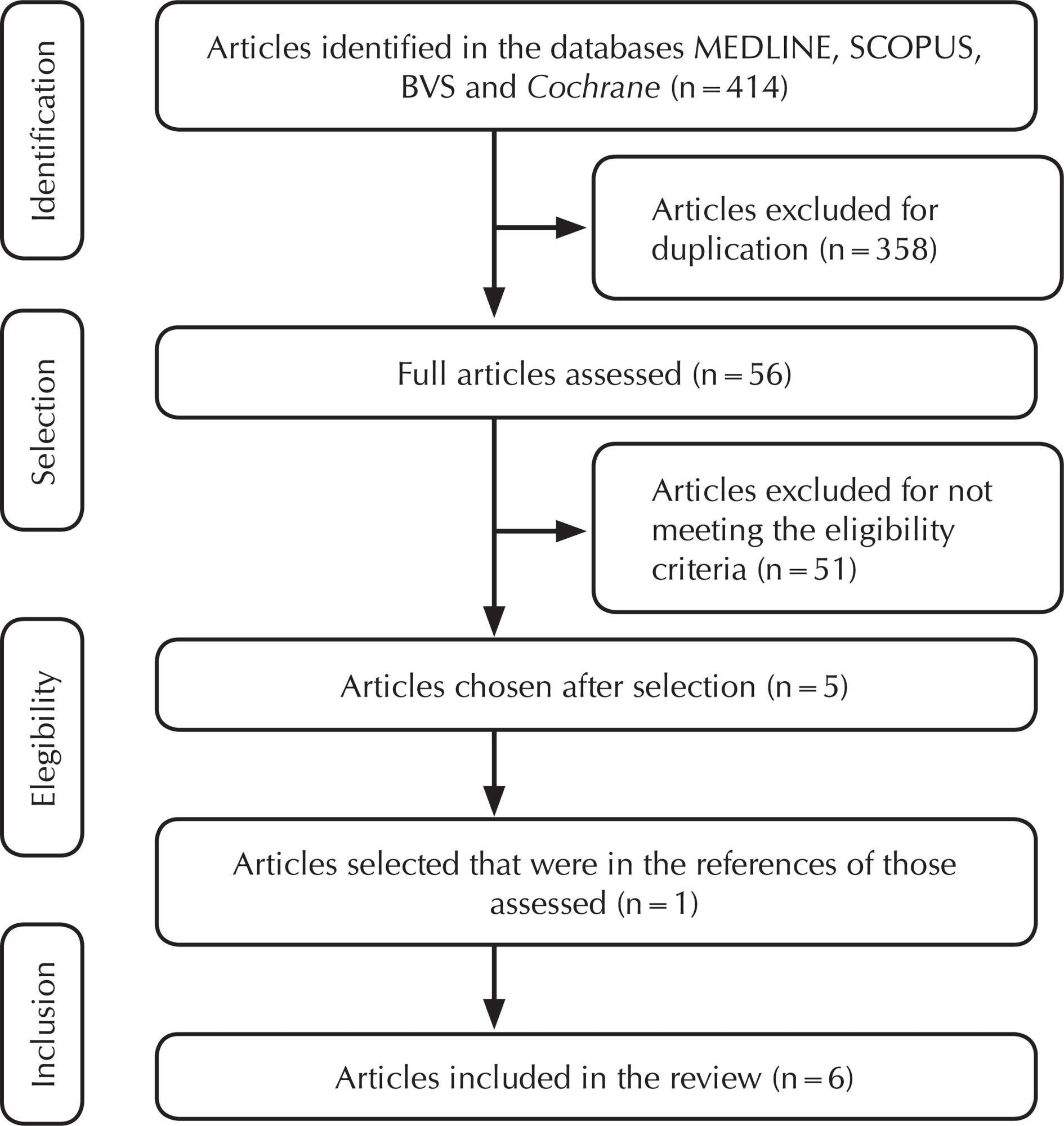-
ORIGINAL ARTICLE
Effectiveness of the self-regulation educational program in increasing knowledge about COVID-19 in Peruvian soldiers
Revista Brasileira de Enfermagem. 2023;76(Suppl 1):e20220498
05-08-2023
Resumo
ORIGINAL ARTICLEEffectiveness of the self-regulation educational program in increasing knowledge about COVID-19 in Peruvian soldiers
Revista Brasileira de Enfermagem. 2023;76(Suppl 1):e20220498
05-08-2023DOI 10.1590/0034-7167-2022-0498
Visualizações0Ver maisABSTRACT
Objective:
To determine the effectiveness of the educational program based on self-regulation of learning in the level of knowledge about COVID-19 in the soldiers.
Methods:
Pre-experimental study with a pre-test and post-test design with a single group, carried out in 2020. 179 soldiers from Puno, Peru participated. Two expository-participatory sessions and a demonstrative workshop were developed. A valid (Aiken’s V = 0.69) and reliable (McDonald’s Omega = 0.81) questionnaire was used. The Friedman’s test was used to compare the results pre and post-test.
Results:
The level of knowledge about COVID-19 and in two of its dimensions changed from poor (pre-test) to regular (post-test). However, in the preventive measures dimension, it changed from poor (pre-test) to excellent (post-test).
Conclusion:
The proposed educational intervention was effective in increasing knowledge about COVID-19 in the soldiers, mainly in terms of preventive measures.

-
ORIGINAL ARTICLE
Effectiveness of therapeutic groups in psychosocial care: analysis in the light of yalom’s therapeutic factors
Revista Brasileira de Enfermagem. 2020;73(Suppl 1):e20200410
12-04-2020
Resumo
ORIGINAL ARTICLEEffectiveness of therapeutic groups in psychosocial care: analysis in the light of yalom’s therapeutic factors
Revista Brasileira de Enfermagem. 2020;73(Suppl 1):e20200410
12-04-2020DOI 10.1590/0034-7167-2020-0410
Visualizações0ABSTRACT
Objective:
to describe professionals’ perceptions about the therapeutic effectiveness of group care.
Method:
a descriptive, exploratory, qualitative research of the type of intervention carried out with 30 professionals from Psychosocial Care Centers for Alcohol and Drugs in a municipality in center-westerns Brazil, from March to April 2019. Self-applicable instruments and round circles were used. The emerging data were submitted to content analysis.
Results:
professionals perceive the benefits of group practices and relate them to some therapeutic factors in the group. It is evident the little formal and systematized knowledge about the group process elements.
Final Considerations:
the therapeutic effectiveness of group processes is compromised due to absence of systematic records that allow to perceive the therapeutic progress of users, even though professionals perceive the emergence of therapeutic factors of the groups in the context of psychosocial care.
Palavras-chave: Community Mental Health ServicesEffectivenessGroup ProcessesHealth PersonnelMental HealthVer mais -
ORIGINAL ARTICLE
Indicators of effectiveness of nursing care in the dimension of patient safety
Revista Brasileira de Enfermagem. 2020;73(3):e20180833
04-22-2020
Resumo
ORIGINAL ARTICLEIndicators of effectiveness of nursing care in the dimension of patient safety
Revista Brasileira de Enfermagem. 2020;73(3):e20180833
04-22-2020DOI 10.1590/0034-7167-2018-0833
Visualizações0ABSTRACT
Objectives:
to validate nursing care effectiveness indicators of patient safety dimension.
Methods:
quantitative survey, using the electronic Delphi sampli, with 52 participants selected by the Snowball sampling. Eight indicators were evaluated regarding the attributes: availability, reliability, simplicity, representativeness, sensitivity, comprehensiveness, objectivity, cost, utility, stability and timeliness. For validation, the minimum agreement criterion was 70%.
Results:
Cronbach’s alpha (0.942) evidenced the high internal consistency among the attributes. The indicators fall with damage, hip fracture, and postoperative hip fracture, incidents related to equipment, incidents due to failures in patient identification, and pressure injury were validated in all attributes, and those of medication error and hand Hygiene were not validated.
Conclusions:
the validated indicators allow assessment of the effectiveness of hospital nursing care. Unavailability of data is an obstacle to monitoring patient safety.
Palavras-chave: EffectivenessNursing CarePatient SafetyQuality Indicators, Health CareQuality ManagementVer mais -
REVISÃO
The effectiveness of post-partum interventions to prevent urinary incontinence: a systematic review
Revista Brasileira de Enfermagem. 2018;71(suppl 3):1460-1468
01-01-2018
Resumo
REVISÃOThe effectiveness of post-partum interventions to prevent urinary incontinence: a systematic review
Revista Brasileira de Enfermagem. 2018;71(suppl 3):1460-1468
01-01-2018DOI 10.1590/0034-7167-2017-0338
Visualizações0ABSTRACT
Objective:
to assess the effectiveness of post-partum interventions to prevent urinary incontinence: a systematic review.
Method:
systematic review of randomized controlled studies conducted in the MEDLINE, Cochrane, Scopus and the Virtual Library on Health (Biblioteca Virtual em Saúde, BVS) databases.
Results:
six articles were included in this review. All studies used the Pelvic Floor Muscle Training as the main procedure to prevent urinary incontinence. The results pointed to a positive and effective intervention in the post-partum period.
Conclusion:
there is evidence that programs of exercise of the pelvic floor musculature performed both in the immediate and late post-partum result in a significant increase in muscle strength and contribute to prevent urinary incontinence.
Palavras-chave: EffectivenessPelvis DiaphragmPost-Partum PeriodPrimary PreventionUrinary IncontinenceVer mais



